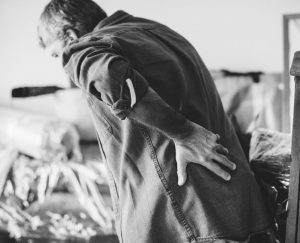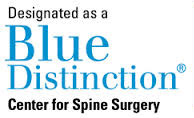Are My Hip Pain and Back Pain Related?
People who suffer from both hip pain and back pain can experience lower back pain, groin pain, thigh pain, pain in the buttocks, and sometimes knee pain. The term “hip-spine syndrome” was coined to describe individuals who suffer from pain in these areas. However, because the pain can vary in location, diagnosing the source of the pain is sometimes more difficult.
If you suffer from both hip and back pain a visit to your doctor or a specialist can help determine the cause (or causes) of your pain. After a complete physical and review of your medical history, a doctor may use advanced imaging techniques to assist them in their diagnosis.
Diagnosis may show that your hip and back pain are related. The pain can be the result of something going on in your hip, spine, or both. In this article we’ll look at a few of the more common conditions of the spine which can lead to both hip pain and back pain.

Herniated Disc and Pinched Nerve Can Lead to Back and Hip Pain
As the discs between the spinal vertebrae age, the outer layer may become compromised, allowing the material to “leak” into the spinal canal. Patients with this condition are said to have a herniated disc. A herniated disc leads to pain when the disc material puts pressure on the nerves protected by the spine. Because the nerves within the spinal cord are responsible for communication between the brain and other areas of the body, this pain can also be felt in other areas of the body.
The lumbar region of the spine is located between the ribs in the pelvis. The five major nerves which emanate from the spine in this region are responsible for communication between the brain and thighs, lower legs, ankles, and feet. They also assist in controlling the abdominal muscles. Pressure on any of these nerves due to herniated disc in the lumbar region of the spine can result in a shooting pain down the legs.
Spinal Stenosis and Hip Pain
Spinal stenosis is similar to a herniated disc in that the pain is a result of pressure on the nerves. However, with spinal stenosis, the pressure is caused by a narrowing of the spinal canal, not with a herniated disc. Some common causes for the narrowing of the canal are cysts, bulging discs, and arthritis.
Even though spinal stenosis may have a different root cause then herniated disc, the resulting symptoms may be similar. Both conditions can lead to pressure on the nerves in both conditions can lead to pain in the back, pain in the hip, and pain down the legs.
Arthritis and Hip Pain
Spinal osteoarthritis is a degenerative arthritis of the spine.
Osteoarthritis is a condition in which the cartilage that lines the joints degenerates or breaks down. As this material stiffens or breaks down, the additional wear and tear on the bones can cause inflammation, bone spurs, and pain.
Spinal osteoarthritis is a condition in which the cartilage and discs in the lower region of the spine degenerate and fail to perform their function of acting as cushions for the joints. This degeneration and increased pressure on the joints can lead to inflammation, pain, and possibly pressure on the lumbar nerves.
Other Causes for Hip Pain and Back Pain
In this article we discussed conditions of the spine which can lead to hip pain. However, there are also hip related conditions which can cause lower back pain. SI joint (sacroiliac joint) dysfunction, osteoarthritis of the hip and other conditions can lead to pain in the hip and lower back. Therefore, if you experience both hip pain and back pain it may make sense to visit your doctor who can help diagnose your condition.
References:
- https://www.health.harvard.edu/pain/think-that-hip-pain-is-bursitis-think-again
- https://www.ryanmiyamotomd.com/pdf/differentiating-hip-pathology-from-lumbar-spine.pdf
- https://www.webmd.com/osteoarthritis/spinal-osteoarthritis-degenerative-arthritis-of-the-spine#main-container
